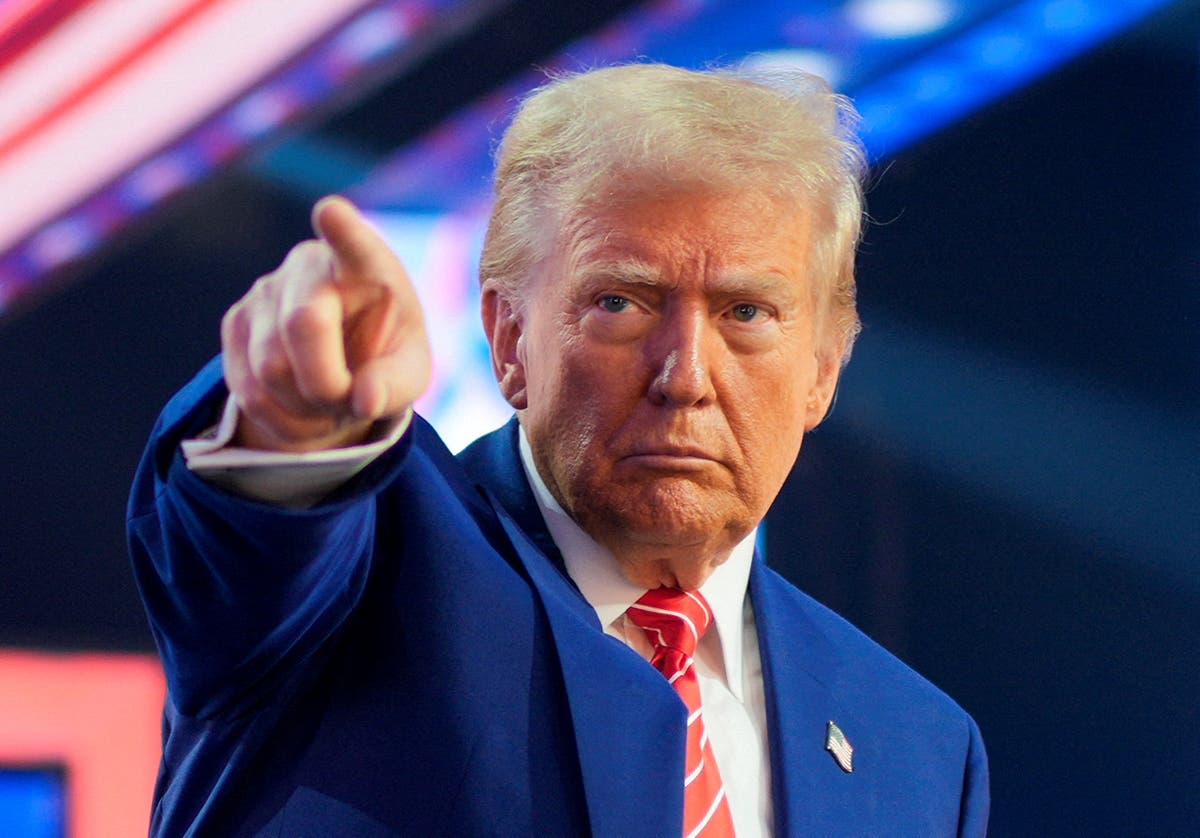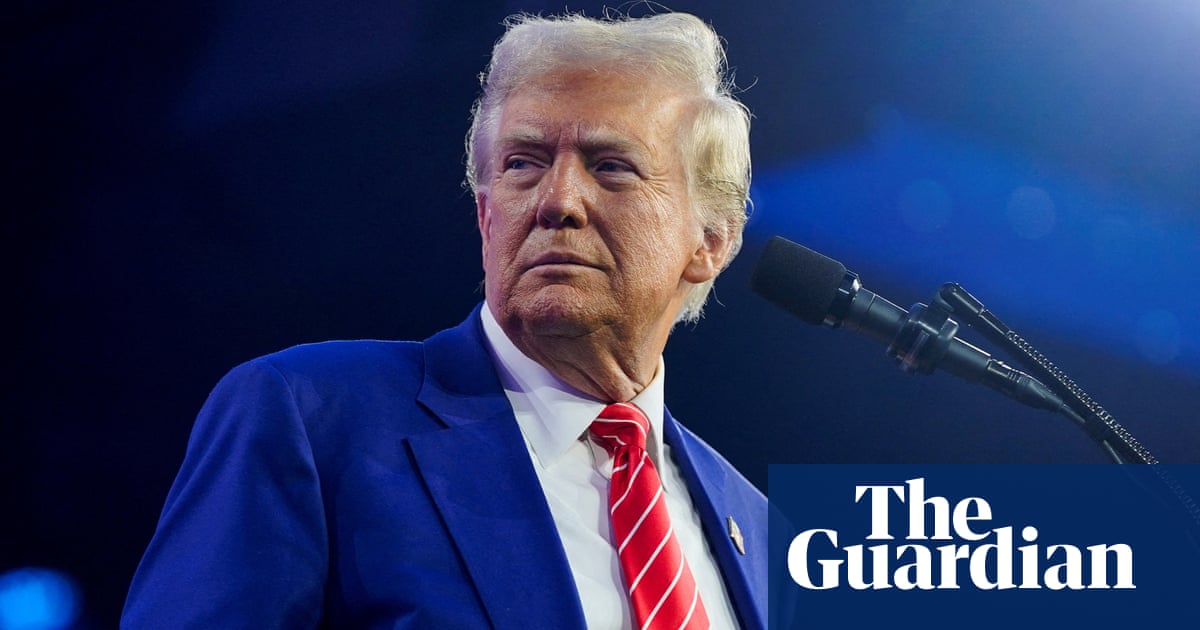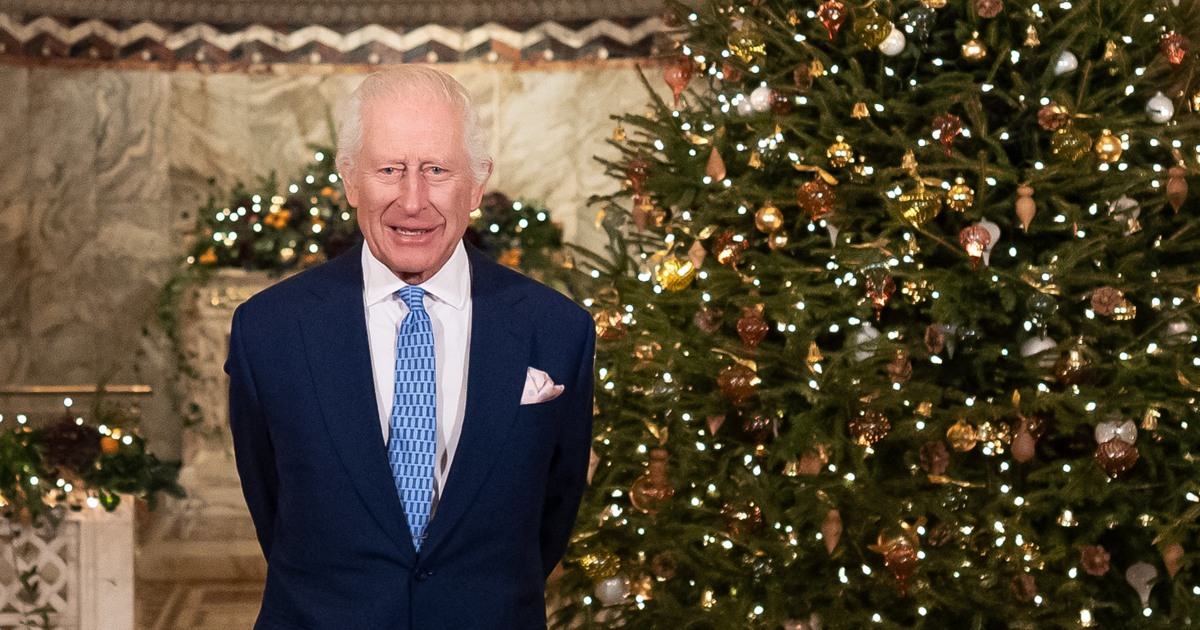World
Inspector general finds no FBI agents were involved in January 6 attack – as it happened

Inspector general report faults FBI for intelligence gathering failure ahead of January 6, says no agents involved in attack
The justice department inspector general found no evidence that employees of the FBI were involved in the January 6 attack, but did fault the bureau for not better communicating with its offices nationwide ahead of the joint session of Congress that descended into mayhem four years ago when Donald Trump’s supporters attacked the Capitol.
In a report released today, the inspector general said: “The FBI effectively carried out its tactical support function on January 6.” However, it faulted the federal law enforcement agency for not checking in with its field offices, which could have corroborated reports that extremist groups were planning to travel to Washington DC.
“The FBI did not canvass its field offices in advance of January 6, 2021, to identify any intelligence, including CHS reporting, about potential threats to the January 6 Electoral Certification,” the inspector general wrote.
“FBI Deputy Director Paul Abbate, who was Associate Deputy Director at the time, described the lack of a canvass prior to January 6 as a ‘basic step that was missed,’ and told the OIG that he would have expected a formal canvassing of sources to have occurred, through the issuance of an intelligence collection product, because it would have been the most thorough approach to understanding the threat picture prior to January 6.”
Rightwing activists have alleged that FBI agents were involved in, or even instigated, the insurrection at the Capitol that took place after Trump addressed a crowd of his supporters on the White House ellipse.
The inspector general found “no evidence in the materials we reviewed or the testimony we received showing or suggesting that the FBI had undercover employees in the various protest crowds, or at the Capitol, on January 6”.
However a total of 26 FBI informants – known as confidential human sources (CHS) – were in the crowd, some of whom entered the Capitol or other restricted areas, the report says:
We determined that of the 26 CHSs who were in DC on January 6 in connection with the events of January 6, 4 entered the Capitol during the riot; an additional 13 entered the restricted area around the Capitol, which was a security perimeter established in preparation for the January 6 Electoral Certification; and 9 neither entered a restricted area nor entered the Capitol or otherwise engaged in illegal activity. None of the CHSs who entered the Capitol or a restricted area has been prosecuted to date.
Key events
Closing summary
Joe Biden issued a sweeping batch of sentence commutations that affected nearly 1,500 people, as well as 39 pardons. The acts of clemency came after the president drew criticism for pardoning his son Hunter Biden, who was about to be sentenced on tax evasion and gun charges. A recently released public opinion poll found most Americans don’t approve of Biden’s decision to pardon his son, but they also are not on board with Donald Trump’s plan to pardon defendants facing charges or convicted over the January 6 attack. Nonetheless, the president-elect told Time magazine in an interview conducted as he was named its “person of the year” that issuing those pardons would be among the first things he will do once he takes office. Trump also promised to make good on campaign promises to expand oil and gas production and carry out mass deportations, while declining to rule out a return of the family separation policy from his first term that was widely condemned as cruel.
Here’s what else happened today:
-
Trump campaigned on lowering grocery prices, but no longer sounds so sure that he can pull it off.
-
An inspector general report found that no FBI agents took part in the January 6 insurrection, though about two dozen informants were at the Capitol or in the crowd. It also said the bureau should have communicated more with its Washington DC field offices about threats to the joint session of Congress held that day.
-
Kari Lake, a failed Republican candidate for governor and senator in Arizona and multi-time election denier, has been named by Trump to lead Voice of America.
-
The president-elect stopped by the New York Stock Exchange to ring the opening bell this morning and celebrate being named Time magazine’s “person of the year”.
-
Jeff Bezos, the billionaire Amazon and Washington Post honcho, plans to meet with Trump next week, while Mark Zuckerberg’s Meta donated $1m to the president-elect’s inauguration fund.
Monmouth University pollsters also asked Americans if they thought Donald Trump would unite the country during his presidency, or divide it further.
Forty-four per cent of respondents said it would wind up more divided, while 34% said it would become more united.
Trump won last month’s election decisively, besting Democratic vice-president Kamala Harris in all seven swing states and the popular vote – the first time a Republican has done so since 2004. Since then, he has not made baseless allegations of fraud, as he did following his election loss in 2020, and the Monmouth poll shows Americans mostly believe the vote was fair.
Eighty-three per cent of respondents described the election as “fair and square”, and 12% said he won due to voter fraud.
Americans are divided on whether to take Donald Trump seriously on his threats to suspend some laws and parts of the constitution and go after his political enemies, a Monmouth University poll released today found.
Among 1,006 adults surveyed in recent days, 48% believe he will make good on the threat, while 47% think it is “more of an exaggeration”.
Were he to follow through, 52% said it would bother them “a lot”, 22% “a little” and 22% “not at all”.
Here’s more on what Trump has said he would like to do to his enemies:
Joe Biden today announced 39 pardons, and nearly 1,500 grants of clemency – two distinct types of relief from criminal convictions that a president is empowered to grant. Here’s more on what the actions mean, from the Guardian’s Sam Levine:
Joe Biden pardoned 39 Americans convicted of non-violent crimes on Thursday, also announcing that he had commuted the sentences of almost 1,500 people who have already been released from prison.
The White House said on Thursday the commutations all relate to people who were released from prisons and placed in home confinement during the Covid pandemic who will now have their sentences reduced. The 39 people being pardoned will have their guilty verdicts wiped entirely.
The announcement, what the White House is calling the single largest act of presidential clemency on a single day in modern US history, comes after Biden’s decision to pardon his son Hunter earlier this month for any federal crimes “he committed or may have committed” between 1 January 2014 and 1 December 2024 has brought renewed focus on the expansive power the US constitution gives the president to grant official clemency.
It’s a power that presidents have deployed since George Washington, who pardoned those involved in the Whiskey Rebellion, to Donald Trump, who pardoned his political allies.
For years after January 6, rightwing conspiracy theorists claimed that Arizona man Ray Epps was in fact a government agent who tricked Trump supporters into attacking the Capitol. No proof of that ever emerged, and earlier this year, Epps was sentenced to probation for his actions during the riot. Here’s more on that, from the Associated Press:
A man targeted by rightwing conspiracy theories about the US Capitol riot was sentenced on Tuesday to a year of probation for joining the January 6 attack by a mob of fellow Donald Trump supporters.
Ray Epps, a former Arizona resident who was driven into hiding by death threats, pleaded guilty in September to a misdemeanor charge. He received no jail time, and there were no restrictions placed on his travel during his probation, but he will have to serve 100 hours of community service.
He appeared remotely by video conference and was not in the Washington courtroom when chief judge James Boasberg sentenced him. Prosecutors had recommended a six-month term of imprisonment for Epps.
Epps’s sentencing took place in the same building where Trump was attending an appeals court hearing as the Republican former president’s lawyers argued he is immune from prosecution on charges he plotted to overturn the results of the 2020 election he lost.
The Fox News Channel and other rightwing media outlets amplified conspiracy theories that Epps, 62, was an undercover government agent who helped incite the Capitol attack to entrap Trump supporters.
A major part of Donald Trump’s campaign was lowering prices that had risen at historic rates during Joe Biden’s presidency.
But, unlike with gravity, what goes up in economics does not necessarily come down. Year-on-year consumer price inflation has declined from its peak of more than 9% in mid-2022 to under 3%, but economists say that does not necessarily mean every price increase will reverse.
Asked about his plan to lower grocery prices in his Time magazine interview, Trump sounded less sure than he did on the campaign trail. “If the prices of groceries don’t come down, will your presidency be a failure?” Time asked. Trump replied:
I don’t think so. Look, they got them up. I’d like to bring them down. It’s hard to bring things down once they’re up. You know, it’s very hard. But I think that they will. I think that energy is going to bring them down. I think a better supply chain is going to bring them down.
In his interview with Time Magazine, Donald Trump suggested that he would pardon many people who faces charges or was convicted for their involvement in the January 6 attack.
“I’m going to do case-by-case, and if they were non-violent, I think they’ve been greatly punished. And the answer is I will be doing that, yeah, I’m going to look if there’s some that really were out of control,” Trump said.
Asked what he would do about those convicted of committing “violent acts”, Trump replied:
Well, we’re going to look at each individual case, and we’re going to do it very quickly, and it’s going to start in the first hour that I get into office. And a vast majority of them should not be in jail.
Despite the FBI’s Washington field office (WFO) and domestic terrorism operations section, both of which were involved in preparations for January 6, not canvassing their field offices ahead of the joint session of Congress, the inspector general finds they did not miss any specific threats.
Instead, they missed information that would have corroborated reports they were already aware of. From the report:
Although the WFO and Domestic Terrorism Operations Section at FBI Headquarters did not direct field offices to canvass their CHSs in advance of January 6, our review of documented CHS reporting in FBI field offices as of January 6 did not identify any potentially critical intelligence related to a possible attack on the Capitol on January 6 that had not been provided to law enforcement stakeholders prior to January 6.
Additionally, our review of information in the FBI’s possession as of January 6, in addition to the then-documented CHS reporting, did not identify any potentially critical intelligence that had not been provided to, or was not otherwise known to, law enforcement stakeholders prior to January 6. Nonetheless, as numerous FBI officials told us, CHS information can be used to corroborate other sources of reporting to help the FBI develop as complete an understanding as possible of the threat picture in advance of an event like the January 6 Electoral Certification, and the FBI therefore should have canvassed its field offices for any relevant CHS information in advance of January 6.
Inspector general report faults FBI for intelligence gathering failure ahead of January 6, says no agents involved in attack
The justice department inspector general found no evidence that employees of the FBI were involved in the January 6 attack, but did fault the bureau for not better communicating with its offices nationwide ahead of the joint session of Congress that descended into mayhem four years ago when Donald Trump’s supporters attacked the Capitol.
In a report released today, the inspector general said: “The FBI effectively carried out its tactical support function on January 6.” However, it faulted the federal law enforcement agency for not checking in with its field offices, which could have corroborated reports that extremist groups were planning to travel to Washington DC.
“The FBI did not canvass its field offices in advance of January 6, 2021, to identify any intelligence, including CHS reporting, about potential threats to the January 6 Electoral Certification,” the inspector general wrote.
“FBI Deputy Director Paul Abbate, who was Associate Deputy Director at the time, described the lack of a canvass prior to January 6 as a ‘basic step that was missed,’ and told the OIG that he would have expected a formal canvassing of sources to have occurred, through the issuance of an intelligence collection product, because it would have been the most thorough approach to understanding the threat picture prior to January 6.”
Rightwing activists have alleged that FBI agents were involved in, or even instigated, the insurrection at the Capitol that took place after Trump addressed a crowd of his supporters on the White House ellipse.
The inspector general found “no evidence in the materials we reviewed or the testimony we received showing or suggesting that the FBI had undercover employees in the various protest crowds, or at the Capitol, on January 6”.
However a total of 26 FBI informants – known as confidential human sources (CHS) – were in the crowd, some of whom entered the Capitol or other restricted areas, the report says:
We determined that of the 26 CHSs who were in DC on January 6 in connection with the events of January 6, 4 entered the Capitol during the riot; an additional 13 entered the restricted area around the Capitol, which was a security perimeter established in preparation for the January 6 Electoral Certification; and 9 neither entered a restricted area nor entered the Capitol or otherwise engaged in illegal activity. None of the CHSs who entered the Capitol or a restricted area has been prosecuted to date.
The day so far
Joe Biden issued a sweeping batch of sentence commutations that affected nearly 1,500 people, as well as 39 pardons. The acts of clemency came after the president drew criticism for pardoning his son Hunter Biden who was about to be sentenced on tax evasion and gun charges. A recently released public opinion poll found most Americans don’t approve of Biden’s decision to pardon his son, but they also are not on board with Donald Trump’s plan to pardon defendants facing charges or convicted over the January 6 attack. Nonetheless, the president-elect told Time magazine in an interview conducted as he was named its “person of the year” that those pardons would be among the first things he will do once he takes office. Trump also promised to make good on campaign promises to expand oil and gas production and carry out mass deportations, while declining to rule out a return of the family separation policy from his first term that was widely condemned as cruel.
Here’s what else has happened today so far:
-
Kari Lake, a failed Republican candidate for governor and senator in Arizona and multi-time election denier, has been named by Trump to lead Voice of America.
-
Trump stopped by the New York Stock Exchange to ring the opening bell this morning and celebrate being named Time magazine’s “person of the year”.
-
Jeff Bezos, the billionaire Amazon and Washington Post honcho, plans to meet with Trump next week, while Mark Zuckerberg’s Meta donated $1m to the president-elect’s inauguration fund.
Democrats may have lost the presidency in the November election, but they made inroads at the state level, including in North Carolina. Regarded as one of the most closely divided in the country, the GOP lost its supermajority in the state legislature last month, and so has moved to strip powers from the incoming Democratic governor and attorney general, the Guardian’s Sam Levine reports:
On the brink of losing their supermajority in the state legislature, North Carolina Republicans overrode a gubernatorial veto on Wednesday to enact a new law that gives them control over elections in the state and strips the incoming Democratic governor and attorney general of some of their powers.
Currently, North Carolina’s governor appoints the five members of the state board of elections, allowing him to select a three-person majority from his party. The new law transfers that appointment power to the state auditor. A Republican won control of the state auditor race this fall for the first time in more than a decade.
The bill also changes how local election boards in each of North Carolina’s 100 counties would be appointed. Currently the state board appoints members and the governor appoints the chair. Under the new law, the auditor-appointed state board would still pick the local boards, but the auditor would pick the chair. Taken together, the new law would give Republicans control over both the state and local boards of elections.
Lawsuits are expected challenging the changes, which were tucked into a bill that allocates more than $200m in relief money for Hurricane Helene. The money will not be immediately availableand the funds cannot be spent until the legislature acts again, according to the Associated Press.
The outgoing governor, Roy Cooper, and the incoming governor, Josh Stein, both Democrats, have criticized the measure as a power grab. Republicans are poised to lose their supermajority in the state legislature next year.
Americans don’t know much about Pete Hegseth, Donald Trump’s pick to lead the defense department, nor Tulsi Gabbard, who the president-elect has nominated as director of national intelligence.
But those who do have opinions of them generally do not see them positively, an Associated Press-NORC Center for Public Affairs Research poll found.
Both Hegseth and Gabbard have attracted controversy, albeit for different reasons. The defense secretary nominee has been accused of sexual assault, and stories have circulated of him mistreating women and cheating on his wives, mismanaging finances at charities he was involved in, and drinking excessively.
Gabbard, a former Democratic congresswoman who recently left the party, is under fire for statements supportive of resigned Syrian president Bashar al-Assad and Russian president Vladimir Putin – both US adversaries.
Here’s what the AP/NORC poll discovered about them. Regarding Hegseth:
Hegseth is still an unknown quantity for many Americans. About 4 in 10 don’t know enough about him to give an opinion, according to the poll. But his selection is viewed more negatively than positively among Americans who do know who he is. About 2 in 10 U.S. adults approve of Hegseth being picked for Trump’s Cabinet, while 36% disapprove and about 1 in 10 don’t know enough to have an opinion.
He has higher support among Republicans, but it’s not overwhelming. Many Republicans do not have an opinion of Hegseth: About 4 in 10 say they don’t know enough about him. About one-third of Republicans approve of him as a pick, and 16% disapprove. Another 1 in 10 Republicans, roughly, are neutral and say they neither approve nor disapprove.
Those approval numbers among Republicans are at least slightly lower for Hegseth than any of the other names included in the poll.
And Gabbard:
Gabbard is as unknown as Hegseth is, but Americans are a little less likely to disapprove of her nomination. About 2 in 10 Americans approve of Trump’s pick of Gabbard, while about 3 in 10 disapprove. The rest either do not know enough to say – about 4 in 10 said this – or have a neutral view.
Approval is slightly higher among Republicans than Hegseth’s, though. About 4 in 10 Republicans approve of the choice, while very few disapprove and 16% have a neutral view. Similar to Americans overall, about 4 in 10 Republicans don’t know enough to say.
Democratic representative Bennie Thompson, the former chair of the House committee invesigating the January 6 attack, says that he would accept a preemptive pardon if one were issued by Joe Biden.
“It’s his prerogative. If he offers it to me or other members of the committee … I would accept it, but it’s his choice,” Thompson said on CNN this morning.
The comments came after president-elect Donald Trump told NBC in an interview that members of the House committee that investigated the January 6 attack on the Capitol should go to jail.
“Everybody on that committee … for what they did, yeah, honestly, they should go to jail,” Trump said.
Photograph: The Washington Post/Getty Images
The Federal Aviation Administration (FAA) chief, Michael Whitaker, will resign on inauguration day and will not continue as the head of the agency in a second Trump administration, according to reports.
Politico reported the news this morning, citing two officials with direct knowledge of Whitaker’s plans. Whitaker reportedly informed his staff of his departure plans during a meeting on Thursday morning.
Whitaker was confirmed as the FAA administrator by the Senate on 24 October 2023. FAA administrators generally serve for five years.
Meta has donated $1m to Donald Trump’s inaugural fund, the company confirmed on Thursday.
The donation appears to be the latest effort by the social media company and its CEO, Mark Zuckerberg, to improve relations with the incoming president, and comes just weeks after Zuckerberg dined with Trump at Mar-a-Lago.
Meta confirmed its donation to the Guardian on Thursday but did not provide details regarding the reason for the contribution.
Read more about it here:
Donald Trump says he plans to meet with Amazon founder and Washington Post owner Jeff Bezos next week.
In brief remarks before the president-elect rang the opening bell at the New York Stock Exchange this morning, he spoke with CNBC and said:
Mark Zuckerberg’s been over to see me, and I can tell you, Elon [Musk] is another, and Jeff Bezos is coming up next week. I want to get ideas from them. Look, we want them to do well. We want everybody [to do well], and we want great jobs, fantastic salaries.
More reactions to the decision by Joe Biden to commute the sentences of almost 1,500 people and pardon 39 Americans convicted of non-violent crimes, are coming in.
Democratic Senator Dick Durbin, who is the chair of the Senate judiciary committee, said in a statement:
The President took an important step by commuting the sentences of these men and women. In far too many cases in our justice system, the punishment doesn’t fit the crime” Durbin added. “I have long advocated for criminal justice reform to address these inequities and commend President Biden for this act of mercy and for his leadership.
These individuals have successfully returned to their communities and reunited with their families. I urge the President to continue using his pardon power during his remaining time in office to address miscarriages of justice, just as the founders of this democracy intended.
Lauren-Brooke Eisen, the senior director of the Brennan Center’s Justice Program, said that the decision was a “vital recognition of the excessively punitive nature of our criminal justice system”.
In a statement Eisen added:
There are thousands more who deserve the same, and we hope to see additional clemencies granted before the end of his term,” Eisen added.
In addition to the group of people included in today’s announcement, the Brennan Center and a coalition of allies have been calling on the president to commute the sentences of the more than 40 people on federal death row to life without parole, and to thousands of people who are serving unfairly long, racially disparate drug sentences.”










